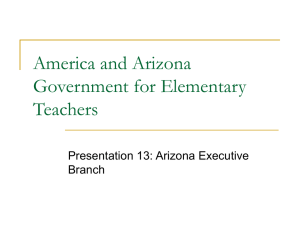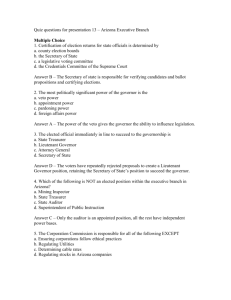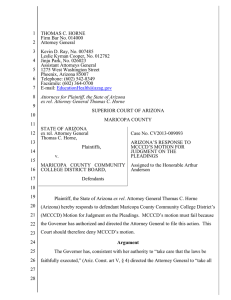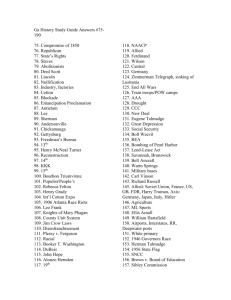Document 10868495
advertisement
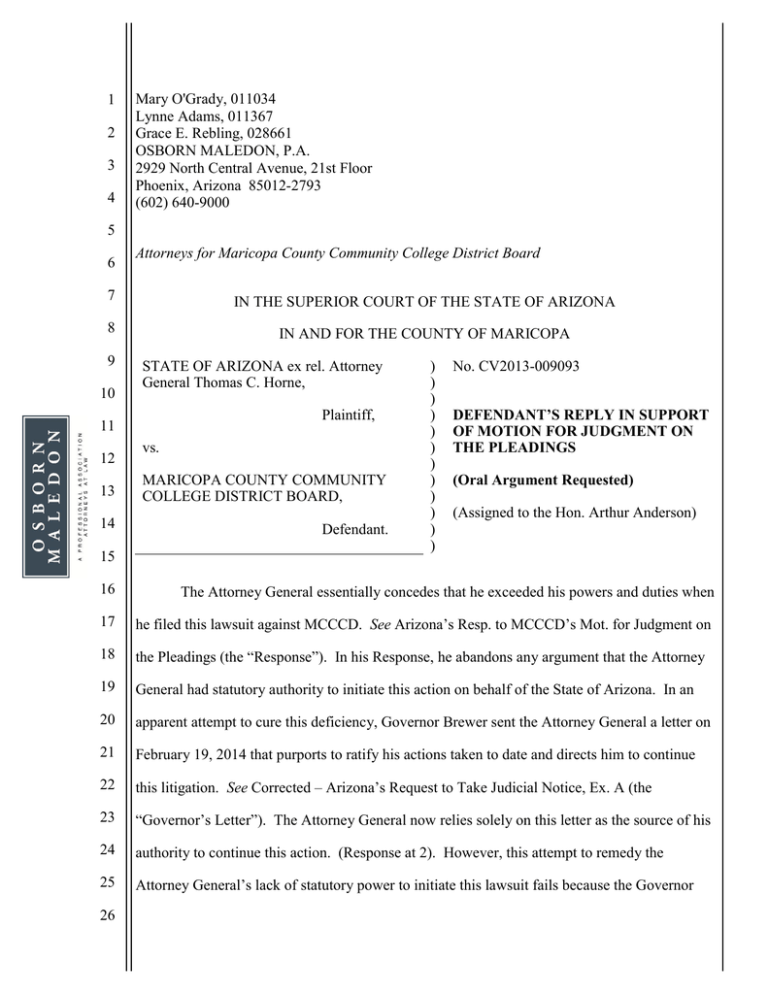
1 2 3 4 Mary O'Grady, 011034 Lynne Adams, 011367 Grace E. Rebling, 028661 OSBORN MALEDON, P.A. 2929 North Central Avenue, 21st Floor Phoenix, Arizona 85012-2793 (602) 640-9000 5 6 Attorneys for Maricopa County Community College District Board 7 IN THE SUPERIOR COURT OF THE STATE OF ARIZONA 8 IN AND FOR THE COUNTY OF MARICOPA 9 10 STATE OF ARIZONA ex rel. Attorney General Thomas C. Horne, Plaintiff, 11 12 vs. 13 MARICOPA COUNTY COMMUNITY COLLEGE DISTRICT BOARD, 14 Defendant. 15 ) ) ) ) ) ) ) ) ) ) ) ) No. CV2013-009093 DEFENDANT’S REPLY IN SUPPORT OF MOTION FOR JUDGMENT ON THE PLEADINGS (Oral Argument Requested) (Assigned to the Hon. Arthur Anderson) 16 The Attorney General essentially concedes that he exceeded his powers and duties when 17 he filed this lawsuit against MCCCD. See Arizona’s Resp. to MCCCD’s Mot. for Judgment on 18 the Pleadings (the “Response”). In his Response, he abandons any argument that the Attorney 19 General had statutory authority to initiate this action on behalf of the State of Arizona. In an 20 apparent attempt to cure this deficiency, Governor Brewer sent the Attorney General a letter on 21 February 19, 2014 that purports to ratify his actions taken to date and directs him to continue 22 this litigation. See Corrected – Arizona’s Request to Take Judicial Notice, Ex. A (the 23 “Governor’s Letter”). The Attorney General now relies solely on this letter as the source of his 24 authority to continue this action. (Response at 2). However, this attempt to remedy the 25 Attorney General’s lack of statutory power to initiate this lawsuit fails because the Governor 26 1 similarly lacks any Constitutional or statutory authority to control the actions of an independent 2 government entity such as MCCCD. She cannot initiate litigation—or direct the Attorney 3 General to initiate litigation—simply because she disagrees with the legal interpretation 4 adopted by a separate and independent government entity. Argument 5 6 I. Neither the Governor nor the Attorney General has carte blanche to bring actions on behalf of the State without constitutional or statutory authority. 7 8 The Attorney General’s Response presumes without citation that the common law 9 powers he does not possess are nonetheless possessed by the Governor. He asserts that the 10 Governor’s authority to direct this litigation against MCCCD arises from her constitutional 11 duty to “take care that the laws be faithfully executed.” (Response at 1). Although the 12 Governor certainly has the authority to supervise the executive department of state government, 13 her executive authority does not empower her to direct this particular lawsuit. 14 The framers of Arizona’s Constitution purposefully divided the executive power among 15 several elected officials, each with limited powers. See Toni McClory, Understanding 16 Arizona’s Constitution 104-05 (2d. ed. 2010). This fragmented structure protects against the 17 abuses that can occur with consolidated executive power. Id. (explaining the Progressive 18 framers’ deep mistrust of government). Accordingly, Arizona’s Constitution provides for a 19 separately elected governor, secretary of state, attorney general, state treasurer, superintendent 20 of public instruction, state mine inspector, and five corporation commissioners. Ariz. Const. 21 art. 5, § 1, arts. 15 & 19. 22 case law for the notion that the common law powers one elected official lacks are residually 23 retained by the Governor, and the Attorney General has cited none. 24 There is simply no support in the Arizona Constitution, statutes, or The powers of the executive department, including those of the Governor, must be 25 found in the Arizona Constitution or the Arizona statutes. See Ariz. Const. art. 5, § 1 26 (confirming that officers of the executive department “shall perform such duties as are 2 1 prescribed by the constitution and as may be provided by law”); Citizens Clean Elections 2 Comm'n v. Myers, 196 Ariz. 516, 523, 1 P.3d 706, 713 (2000) (acknowledging that the 3 Governor’s powers are not unlimited); cf. State v. Block, 189 Ariz. 269, 272, 942 P.2d 428, 431 4 (1997) (“In Arizona, the Attorney General has no common law powers; whatever powers he 5 possesses must be found in the Arizona Constitution or the Arizona statutes.”). Neither the 6 Arizona Constitution nor statute provides the Governor with authority to initiate or direct a 7 declaratory judgment action against an independent governmental entity because the Governor 8 disagrees with its interpretation of state law. 9 10 A. Article V, § 4 of the Arizona Constitution does not provide the Governor authority to direct this litigation. The Arizona Constitution provides that the Governor “shall transact all executive 11 business” and “shall take care that the laws be faithfully executed.” Ariz. Const. art. 5, § 4. 12 Arizona courts have never extended this duty as far as the Attorney General asks this Court to 13 do here. 14 The Attorney General has cited McFate as “clear” authority that “the Governor has the 15 power to direct that appropriate steps are taken to bring a political subdivision of the state, such 16 as MCCCD, into compliance with Arizona law.” (Response at 2). However, the case states 17 only that “the Governor alone, and not the Attorney General, is responsible for the supervision 18 of the executive department and is obligated and empowered to protect the interests of the 19 people and the State by taking care that the laws be faithfully executed.” Ariz. State Land Dep’t 20 v. McFate, 87 Ariz. 139, 148, 348 P.2d 912, 918 (1960). Specifically, the McFate Court held 21 that “[w]ith reference to the instant situation, the State Land Commissioner is appointed by the 22 Governor, may be removed by the Governor for cause, and is required to report annually to the 23 Governor concerning the activities of the State Land Department.” Id. (internal citations 24 omitted). The case does not give the Governor any authority over a governmental entity not 25 subject to gubernatorial supervision or control. 26 3 McFate is consistent with the notion that the Governor’s duty to take care that the laws 1 2 are faithfully executed extends only to her obligations to supervise the executive department. 3 That is her Constitutional realm of power and control. As the Arizona Supreme Court has 4 noted, the “reasonable implication” of the Governor’s authority to “take care that the laws be 5 faithfully executed,” is that “as part of his executive power he should select those who were to 6 act for him under his direction in the execution of the laws. The further implication must be, in 7 the absence of any express limitation respecting removals, that as his selection of 8 administrative officers is essential to the execution of the laws by him, so must be his power of 9 removing those for whom he cannot continue to be responsible.” Ahearn v. Bailey, 104 Ariz. 10 250, 253, 451 P.2d 30, 33 (1969); accord Citizens Clean Elections Comm'n, 196 Ariz. at 523, 1 11 P.3d at 713. This litigation against MCCCD does not involve supervision of the executive 12 13 department.1 As the Complaint recognizes, MCCCD is a separate governmental subdivision of 14 the State that is governed by an elected governing board. (Compl. ¶ 3). The governing board is 15 directly responsible to the electorate and not subject to gubernatorial supervision. To accept 16 the Governor’s broad assertion of power over MCCCD would expand the Governor’s powers 17 far beyond the powers granted to her by the Arizona Constitution. 18 B. There is no statutory authority for this lawsuit. 19 The Governor’s Letter asserts that A.R.S. § 41-193(A)(2) provides her with “authority 20 to direct the attorney general to prosecute and defend any proceeding in a state court in which 21 the state has an interest.” (Governor’s Letter at 1). As noted in MCCCD’s Motion (at 4), 22 23 24 25 26 1 Nor does this litigation involve a direct harm to the Governor’s constitutional authority. See Brewer v. Burns, 222 Ariz. 234, 237 ¶ 12, 213 P.3d 671, 674 (2009) (holding that Governor had standing to bring lawsuit against Legislature because the “Legislature’s refusal to present her with finally passed bills violates the constitutionally established procedure for lawmaking and undermines her express authority to veto or approve bills”). Here the Governor asserts only the general interests of the people of the State; she has sustained no injury related to her office. 4 1 Arizona courts have long recognized that this section presupposes a properly instituted 2 proceeding in which the State has an “interest.” McFate, 87 Ariz. at 145, 348 P.2d at 916. 3 This section “does not permit the Attorney General, in the absence of specific statutory power, 4 to initiate an original proceeding.” Id. (emphasis added). Nor does this section permit the 5 Governor to direct the Attorney General to take action in the absence of specific statutory 6 authority. In other words, the Governor may direct the Attorney General to take action where, 7 in his discretion, he has chosen not to act even though he has the statutory power to initiate or 8 defend an action. Cf. Block, 189 Ariz. at 272, 942 P.2d at 431 (explaining that the Attorney 9 General has no common law powers). The Response cites no other statutory authority that permits the Governor to initiate this 10 11 action. And although A.R.S. § 41-101(A)(5)-(7) permits the Governor to direct the attorney 12 general in certain actions, that statute does not provide the Governor with the authority to direct 13 him to file this lawsuit challenging an independent governmental subdivision’s interpretation of 14 state law. Conclusion 15 The Court should dismiss the Complaint because the Attorney General had no statutory 16 17 authority to bring a lawsuit against MCCCD and the Governor has no authority to ratify his 18 actions and direct that the litigation continue. 19 /// 20 /// 21 /// 22 23 24 25 26 5 1 DATED this 17th day of March, 2014. 2 OSBORN MALEDON, P.A. 3 4 By /s/ Lynne C. Adams Mary O'Grady Lynne Adams Grace E. Rebling 2929 North Central Avenue 21st Floor Phoenix, Arizona 85012-2793 5 6 7 8 Attorneys for Maricopa County Community College District 9 10 COPY of the foregoing e-filed and a COPY e-delivered this 17th day of March, 2014, to: 11 12 13 The Honorable Arthur Anderson Maricopa County Superior Court East Court Building 101 W. Jefferson Phoenix, AZ. 85003-2243 14 15 16 17 18 19 20 21 22 23 24 25 Copy of the foregoing served via e-mail this 17th day of March, 2014, to: Kevin D. Ray Leslie Kyman Cooper Jinju Park Assistant Attorneys General 1275 West Washington Street Phoenix, AZ 85007 EducationHealth@azag.gov Leslie.cooper@azag.gov Attorneys for the State of Arizona ex rel. Attorney General Thomas C. Horne Victor Viramontes Martha L. Gomez Mexican American Legal Defense and Educational Fund 634 S. Spring St., 11th Floor Los Angeles, CA 90014 VViramontes@MALDEF.org MGomez@MALDEF.org Attorneys for Proposed Intervenor-Defendants 26 6 1 2 3 4 Jose de Jesus Rivera Nathan J. Fidel Haralson, Miller, Pitt, Feldman & McAnally, PLC 2800 N. Central Ave., Suite 840 Phoenix, AZ 85004 jrivera@hmpmlaw.com nfidel@hmpmlaw.com Attorneys for Proposed Intervenor-Defendants 5 6 7 8 Daniel R. Ortega Ortega Law Firm 361 E. Coronado Rd. Phoenix, AZ 85004 Danny@ortegalaw.com Attorneys for Proposed Intervenor-Defendants 9 10 /s/ Dian Burton 5368797_2 11 12 13 14 15 16 17 18 19 20 21 22 23 24 25 26 7
